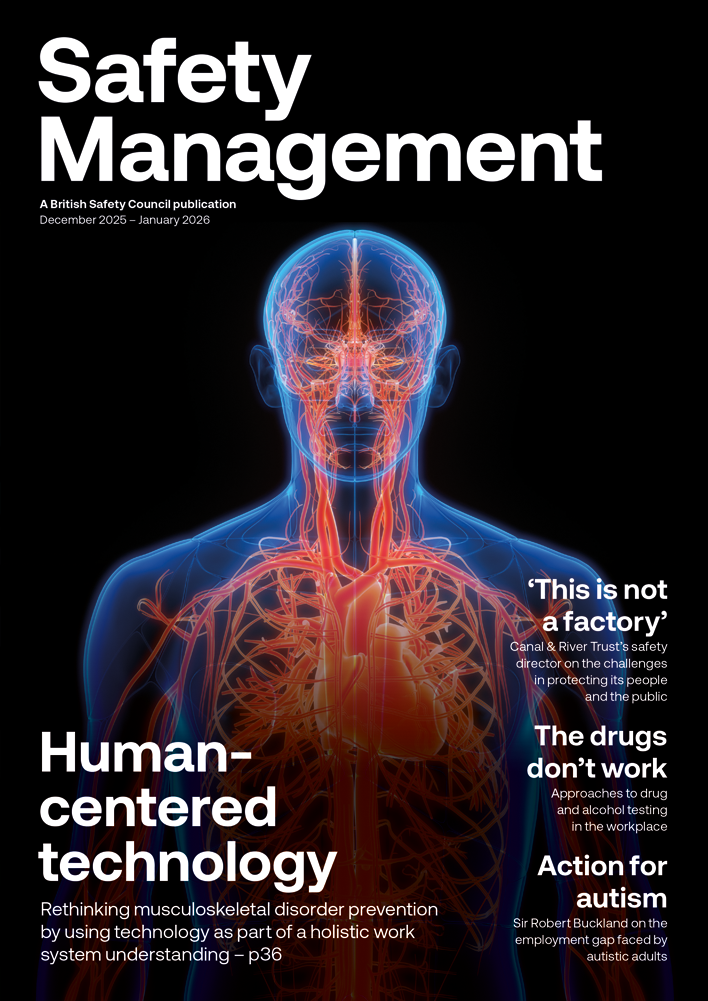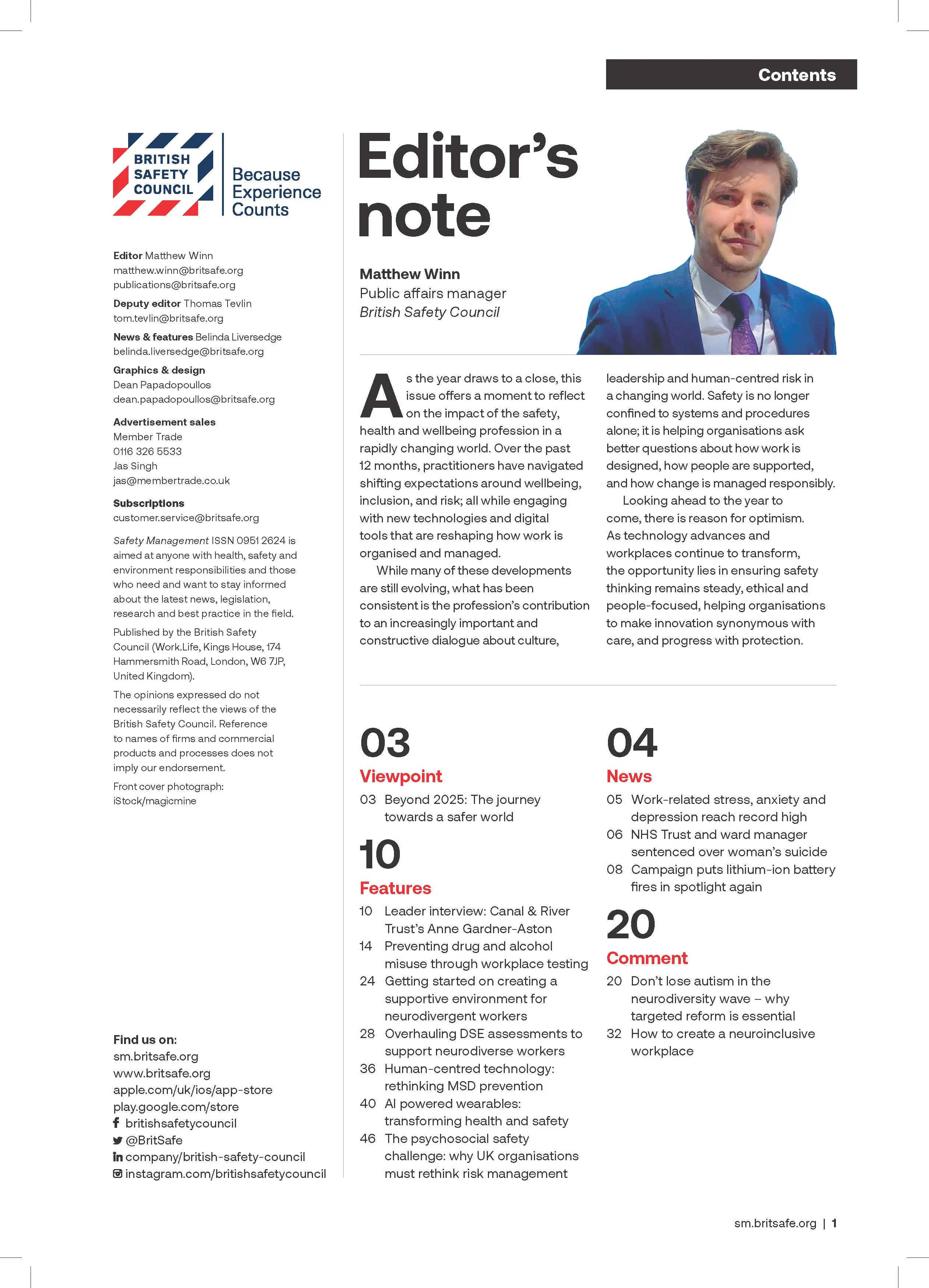Poor quality sleep can affect both our physical and psychological wellbeing, but simple lifestyle changes can make a big difference.
Features
The big sleep
If you feel like your sleep quality could be better, you are not alone. According to the NHS, a third of people in the UK are affected by insomnia, and a RAND Europe study showed that 200,000 working days are lost each year in the UK due to insufficient sleep, at a cost of around £30 billion to the economy.
 Photograph: iStock/Phoenixns
Photograph: iStock/Phoenixns
All is not lost, however, as although the science behind why and how we sleep and what impact this has on our health might be complex, the things we can do to improve the quality of our sleep are really quite straightforward.
For example, this can include being more aware of when we consume alcohol or choose to have our last cup of tea or coffee in the day. It could be avoiding the use of e-readers or other technology in bed to enhance the quality of our sleep.
The main message around sleep is it’s best to ‘think small and act big’ – make small changes and commit to them rather than trying to change everything and you will soon be waking up feeling more refreshed.
In this piece, I will look at what leads our body to sleep, what factors might inhibit a good quality of sleep, and crucially what we may be able to do with our lifestyle choices to help optimise the quality, possibly improve the length of our sleep and ultimately enhance our wellbeing.
Sleep has changed
In the past 100 years, we have seen massive changes to our lives. One of the most interesting changes has been to our sleeping habits. An average sleep time in the 1900s was recorded as being 13 hours per night whereas in more recent years this has been recorded as six hours per night.
Why has this happened? One answer put forward may simply be the use of electricity. In the early 1900s, gas, electricity and coal were expensive, so when the sun went down many people went to sleep. Nowadays, when the sun goes down we simply switch on a light, watch TV or use other forms of technology for entertainment. Because of this, we now live out-of-sync with the normal light/dark cycle, and we now average only six hours of sleep per night.
While we may like to convince ourselves that we can cope with very little sleep, there is plenty of evidence that this lack of sleep is starting to affect our health. This article will explore how insufficient sleep may lead to an increase in weight, higher risk of diabetes, elevated blood pressure, lowered immunity and impaired psychological functionality.
Obesity
One of the many reasons a good sleep pattern is important is the link with weight control. Certain hormones are directly linked with appetite and fat storage. Decreases in sleep are responsible for altering the balance of these hormones. While there are hormonal changes following poor sleep that influence weight gain, there are other things to consider.
One of the more obvious factors is that sleep loss will lead to tiredness and fatigue, which of course will have an impact on our energy levels and motivation. Based on this tiredness and fatigue, we are likely to perform less physical activity. A lack of sleep also causes a reduction in growth hormone. Growth hormone is associated with helping the body to use fat as an energy source. With insufficient sleep reducing growth hormone in the body, this leads to a reduction in metabolism and lower levels of lean tissue; these in turn can result in excess fat storage.
In addition, when sleep levels are low, leptin release is impaired. Leptin is associated with appetite control – that is, when leptin is released into the blood stream, it stimulates a decrease in appetite. As leptin levels drop, appetite increases, again contributing to a gain in weight. Further weight gain is encouraged by the increased production of ghrelin, which stimulates appetite and is associated with an increase in carbohydrate cravings, therefore encouraging overeating.
Following these hormonal changes comes an increase, not only in hunger but also in the poor selection of food choices, especially energy-dense carbohydrates. Coupled with the increase in food intake comes a decrease in energy expenditure. Research has shown that those with low levels of leptin seem to also perform low levels of physical activity.
Lastly, when we sleep less we are of course awake for more time, which presents an opportunity to eat more throughout the waking hours. Being awake for longer may result in the perception that we need more energy and therefore we consume more energy-dense foods. When you combine each of these factors, this may not only lead to weight gain but could lead to obesity, which increases the risk of other ailments – such as diabetes, heart disease and metabolic syndrome.
Diabetes
Perhaps even more concerning is the effect that even one night of sleep deprivation can cause. There is evidence that decreased sleep results in an increase in glucose production by up to 22 per cent, which could lead to insulin resistance. This could unfortunately become a risk factor for diabetes development. Furthermore, loss of sleep increases the amount of free fatty acids circulating by around 19 per cent, which indicates impaired glucose metabolism, increased insulin resistance and generally poorer glucose tolerance.
It is possible that this happens because of a failure of the person experiencing poor sleep to achieve slow-wave, deep sleep, which we will cover later in this article. This stage of the sleep cycle is associated with a decrease in use of glucose by the brain, stimulation of growth-hormone release, inhibition of stress hormones like cortisol and decreased fight-or-flight system activity. All of which affect total-body glucose regulation and homeostasis.
Blood pressure
Another concern is the association between changes in sleep pattern and increased cardiovascular disease risk. Poor sleep leads to an increased release and decreased removal of certain stress hormones.
This results in elevated heart rate and subsequently elevated blood pressure. While this is not an issue in the short term, if this change in blood pressure persists over time it may result in a higher risk of heart disease.
The quality of sleep we achieve is very important, but the quantity may also have a role to play. In one study, for every hour lost to sleep deprivation there was an increased risk of developing hypertension by up to 37 per cent. Furthermore, those who spent more time in shallow sleep and less than four per cent of their sleep in ‘deep sleep’ were up to 80 per cent more likely to develop hypertension. The risk of developing hypertension is significant. Mainly because for each rise in blood pressure of 20 mmHg systolic (the top number) or 10 mmHg diastolic (the bottom number), our risk of heart disease may double.
Immunity
Another unfortunate outcome of poor sleep habits is that immune function can become impaired. When an individual is unable to achieve enough sleep the levels of ‘natural killer’ cells within the body are decreased. Natural killer cells (or NK cells) are a type of white blood cell that constitute a major component of the innate immune system, that is, the part of the immune system that acts as our first line of defence against invading organisms. NK cells play a major role in the rejection of tumours and cells infected by viruses. If the number of these cells is decreased, the body may become more susceptible to illness, and less able to fight off disease development.
Psychology and energy
Some further complications that come with a lack of sleep include the psychological changes that occur. A lack of sleep can impair judgment, with focus and concentration not being as good as they could be, and motivation to behave in a healthy manner is decreased.
In addition, people tend to become more stressed when they feel that they are not getting enough sleep. For some people this will cause them to become short-tempered, for others they may become overly emotional. Neither of these behaviours help to maintain a good level of general wellbeing. The hormones adrenaline, noradrenaline, and most importantly cortisol, are associated with our natural stress response and when circulating at the right level can help with physical performance. However, having excess levels of these hormones in the blood stream may have further implications for blood sugar control, fat storage and weight gain.
Linked to psychological responses, as we have already covered, the drop in energy levels associated with a lack of sleep may lead people to overeat as they try to use food to raise their energy back up. In these situations, the food choices tend to be poor, with refined carbohydrates and caffeine being at the top of the list.
 Photograph: iStock/Tero Vesalainen
Photograph: iStock/Tero Vesalainen
The issue with these choices is that they only give a temporary lift in blood sugar, before it comes crashing back down, leaving the individual with lower energy levels than they need. In addition, high carbohydrate choices are easily converted and then stored as fat in the body, resulting in additional weight gain. Coupled with these changes in energy comes less exercise and also poor concentration, simply due to the brain not having sufficient or appropriate energy to function optimally.
Abnormal rhythm of cortisol
When the adrenal glands are forced to work harder than normal due to a high intake of teas and coffees, lots of little stressors and a lack of relaxation, they lose their natural 24-hour rhythm and ability to respond to stressors. Instead, their output changes so that they simply release a constant level of cortisol. This means that when a person wakes up in the morning, the level of cortisol is too low, leading to feelings of tiredness in the morning. Also, because cortisol stimulates the appetite, a low level of cortisol in the mornings means that a person may wake up without an appetite and not wanting a breakfast.
Conversely, cortisol levels at the end of the day are too high. As cortisol is an energising hormone, it leads to a conflict within the body, whereby the person recognises that they need sleep and yet is unable to stop their brain being active. This is the classic ‘tired-but-wired’ phenomenon. For us to have a better understanding of what happens within the brain at night, we need to understand the brain waves during sleep.
Brain waves and sleep
The process of sleep itself is very important in the process of recovery and restoration. Most often, people focus on the length of sleep they get each night. While this is important, it is arguably more important to focus on the quality of sleep. It is not uncommon for people to sleep for eight hours, and yet wake up feeling as if they haven’t slept. In order to understand why this happens, it is important to examine sleep architecture.
When a person moves from being awake to being deeply asleep, they follow a very specific pattern. In global terms there are two main phases of sleep, which include non-rapid eye movement (NREM) and rapid eye movement (REM), but within these two main phases there are multiple stages.
First, the person enters a stage of sleep known as NREM-1, which is dominated by Beta and Alpha brain waves. In this stage, the person is dozing, and is likely to be able to respond to a question (although will sound slightly sleepy). NREM-1 is the stage between being awake and falling asleep and is classed as the lightest sleep stage.
After this stage, the person moves into NREM-2, which is dominated by Alpha and Theta waves. In this stage, the person may appear asleep, but will still be able to respond if you call their name. Some people in this stage experience the sensation that they are falling and may jerk back awake. NREM-2 accounts for approximately 50 per cent of sleep. NREM-1 and NREM-2 are both referred to as shallow sleep.
NREM-2 is classed as the onset of sleep in which the person is becoming disengaged from their surroundings. Breathing and heart rate are regular but starting to slow down and the body temperature drops (so sleeping in a cool room is helpful for drifting into this stage). After NREM-2, the individual passes into NREM-3, which is predominantly Theta and a small amount of Delta waves. The person will now be asleep.
After NREM-3, the person moves into NREM-4 (when more than 50 per cent of the brain waves are Delta). This is the deepest level of sleep, and it appears that NREM-4 is vital in regulating hormonal levels and physical repair. Access to NREM-4 triggers the release of human growth hormone, which stimulates maintenance and growth of lean tissue; regulates leptin, which manages body fat levels, and ensures minimal release of ghrelin, which stimulates cravings for refined carbohydrates at high levels. Achieving NREM-4 also assists with blood pressure being reset for that day and also appropriate regulation of cortisol.
Stages three and four of sleep are the deepest and most restorative sleep. Breathing becomes slower, muscles are relaxed, blood supply to the muscles increases, tissue growth and repair occurs and also energy levels are restored.
REM sleep is classed as stage five, but does not necessarily occur in numerical order. REM sleep is the active period of sleep characterised by intense brain activity with mostly Alpha brain waves and is when dreaming takes place. Unfortunately, a number of common factors can obstruct the normal sleep architecture. The ones that I have picked to discuss in this article include caffeine, alcohol and electronic devices.
Caffeine and adenosine
As we have previously covered, adenosine is put forward as one of the key hormones involved in helping us to drift off to sleep. As adenosine is created in the brain, it binds to adenosine receptors. The binding of adenosine causes drowsiness by slowing down nerve cell activity.
In the brain, adenosine binding also causes blood vessels to dilate, most likely to let more oxygen in during sleep. Unfortunately, caffeine has an effect on the recognition of adenosine.
To a nerve cell, caffeine looks like adenosine. Caffeine therefore binds to the adenosine receptor. However, it doesn’t slow down the cell’s activity like adenosine would. As a result, the cell can no longer identify adenosine because caffeine is taking up all the receptors that adenosine would normally bind to. Instead of slowing down because of the adenosine’s effect, the nerve cells speed up.
People often say that they can have a coffee in the evening and still sleep okay. However, caffeine has a half-life of five to seven hours so if you drink 150 mg at dinner time, you could still have 75 mg in your body at midnight, at which point some may wonder why they cannot get to sleep. Although some people may be able to fall asleep okay after consuming caffeine in the evening, the quality of sleep for that night is unlikely to be optimal.
Alcohol consumption
Although alcohol is a cognitive relaxant – that is, it makes us feel mentally relaxed – it is in fact a physiological stimulant. This means it activates the body’s fight-or-flight system in the same way that stress does. People may feel like they sleep deeper after consuming alcohol, but this is not actually the case. In a similar fashion to caffeine, consuming alcohol before bed may impact on the ability to achieve the deeper and more restorative stages of the sleep cycle.
Melatonin
As previously mentioned, melatonin is one of the key hormones of the circadian rhythm. It is made in the pineal gland of the brain and is almost five times more potent as an antioxidant than vitamin C. As a potent antioxidant, put simply melatonin helps to mop up waste left behind after cell mitosis, which is the product of old cells being replaced. Furthermore, melatonin is an oncostatic agent, which not only influences the sleep/wake cycle and anti-ageing but also helps to fight cancer.
Wireless technology may be having an impact on melatonin secretion, especially with the use of electronic readers and tablet PCs being used more than ever.
Recent research has highlighted the impact that e-readers have on our sleep cycle. The subjects were monitored in a controlled environment for 14 days and were given either a traditional book or an e-reader for five consecutive nights, and then given the alternative device for five nights. The subjects had their sleep monitored, and blood tests taken so their melatonin levels could be analysed. To no surprise, when the subjects were given the e-readers at night they had significantly lower levels of melatonin during the evening than when they were given a traditional book.
Also, the use of the e-reader resulted in it taking 10 minutes longer to fall asleep than for those reading a normal book, and reduced the amount of REM sleep experienced. This would have impacted on both their physical and emotional repair. Not only was it more difficult for the subjects to get to sleep, but they were also less alert the following morning.
The evidence suggests the use of e-readers or other smart electronic devices at bedtime has significant effects on both circadian rhythms and sleep quality and we should avoid using them before we hit the sack.
Sleep physiology
There are two proposed mechanisms for what makes us fall asleep at night. The first mechanism is sleep homeostasis. Homeostasis is the process by which the body maintains a steady state of internal conditions such as blood pressure, body temperature and acid–base balance. The amount of sleep each night is also under homeostatic control. From the time that we wake up, the homeostatic drive for sleep accumulates, reaching its maximum in the late evening when most individuals fall asleep.
Although the neurotransmitters of this sleep homeostatic process are not fully understood, there is evidence to indicate that one may be the sleep-inducing chemical, adenosine. As adenosine levels rise during the day, we have a corresponding rise in sleep need that eventually gets to a critical point, resulting in the necessity to sleep in order to return the adenosine levels to their baseline overnight. Conversely, during sleep levels of adenosine decrease, thereby reducing the need for sleep.
The second mechanism is that of circadian rhythms. Circadian rhythms refer to the cyclical changes – like fluctuations in body temperature, hormone levels and sleep that occur over a 24-hour period, driven by the brain’s biological clock. The biological clock consists of a group of neurons in the hypothalamus of the brain called the suprachiasmatic nucleus. These internal 24-hour rhythms in physiology and behaviour are synchronised to the external physical environment and social or work schedules.
The circadian clock also helps promote wakefulness. Thus, the homeostatic system tends to make us sleepier as time goes on throughout the waking period, regardless of whether it’s night or day, while the circadian system tends to keep us awake as long as there is daylight, prompting us to sleep as soon as it becomes dark.
Two key hormones involved in our circadian rhythm are cortisol and melatonin. Cortisol is an energising hormone that gives us energy and stimulates our hunger and is released from an area in the body called the adrenal gland, which is situated just above the kidneys. Melatonin is a potent antioxidant that is only released in high quantities at night and is released from a specific area of the brain called the pineal gland.
The release of cortisol into our blood usually has a very precise 24-hour rhythm. It is low throughout the night (which makes sense, because we don’t want to be full of energy when we are trying to sleep) and then rises rapidly when light stimulates receptors in our body. This means that cortisol is normally highest between 6am and 8am, meaning we should wake up at this time feeling full of energy and very hungry for breakfast. After this time, cortisol levels drop fairly rapidly. By 6pm to 8pm, cortisol levels should be fairly low so that we feel sleepy.
Low levels of cortisol stimulate the release of melatonin, which tells our body it is time to sleep. Cortisol levels are low around 2am to 4am (when our sleep is deepest), and then rise rapidly when stimulated by light such as sunshine. There are some fluctuations across the day which should correspond with feelings of hunger and the need for meals. The general trend though, is that cortisol levels are high first thing in the morning and then gradually decrease through the day.
The problem with our modern way of living is that we are often fighting against our body’s natural rhythms; we are always trying to do more work or stay out longer. Fighting against natural circadian rhythms leads to diminished physical and mental performance, and there are many common things that cause disruption of the circadian system including: insomnia; shift work; stress; high intake of stimulants; and light stimulus. Some of these factors can be avoided through lifestyle management, but some are harder to manage than others.
Marcus Herbert is head of wellbeing at British Safety Council.
NHS guidance on sleep is at:
FEATURES

Underpinning safety training with neuroscience for long lasting impact
By SSE Active Training Team (ATT) on 30 November 2025
A behavioural safety training programme developed by Active Training Team for energy provider SSE has been carefully designed with neuroscientific principles in mind – resulting in a prestigious industry award for Best Training Initiative in 2024.

Why a painted line will never be enough
By UK Material Handling Association (UKMHA) on 20 November 2025
Businesses that operate material handling equipment like forklifts are being urged to submit accident and near miss details to a new confidential reporting portal so the industry can identify what needs to be done to improve safety standards.

Why workplace transport training is changing in 2026 and what it means for employers
By AITT on 14 January 2026
New workplace transport training categories due in January mean it is essential to ensure operators of material handling equipment have the necessary training for the exact type of machine they use, and accredited training providers are an ideal source of advice and conversion training.



